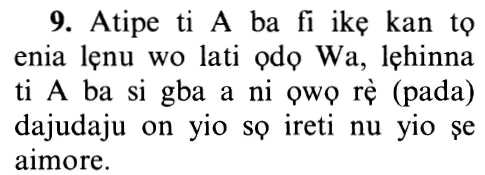11vs9
Select any filter and click on Go! to see results
وَلَئِنْ أَذَقْنَا الإِنْسَانَ مِنَّا رَحْمَةً ثُمَّ نَزَعْنَاهَا مِنْهُ إِنَّهُ لَيَؤُوسٌ كَفُورٌ
Walain athaqna alinsana minna rahmatan thumma nazaAAnaha minhu innahu layaoosun kafoorun
Index Terms
Click to play
Yoruba Translation

Hausa Translation
Kuma lalle ne idan Mun ɗanɗana wa mutum wata rahama daga gare Mu, sa´an nan kuma Muka zãre ta daga gare shi, lalle ne shĩ, hakĩka, mai yanke tsammãni ne, mai yawan k?firci.
Asbabu n-Nuzuul (Occasions of Revelation)
The changing of Man's Attitude in Happiness and Hardship
Allah says;
وَلَئِنْ أَذَقْنَا الإِنْسَانَ مِنَّا رَحْمَةً ثُمَّ نَزَعْنَاهَا مِنْهُ إِنَّهُ لَيَئُوسٌ كَفُورٌ ﴿٩﴾
وَلَئِنْ أَذَقْنَاهُ نَعْمَاء بَعْدَ ضَرَّاء مَسَّتْهُ ...
And if We give man a taste of mercy from Us, and then withdraw it from him, verily, he is despairing, ungrateful.
But if We let him taste good (favor) after evil (poverty and harm) has touched him,
Allah, the Exalted, informs about mankind and the blameworthy characteristics that he possesses, except for those believing servants upon whom Allah has bestowed His mercy.
Allah explains that when any hardship befalls man, after he has experienced blessings, he is disheartened and he despairs of any good in the future. He denies and rejects (the bounties of) his previous condition. Thus, he behaves as if he has never seen any good and he loses all hope for relief (from his situation).
Likewise, if any blessing befalls him after displeasure,
... لَيَقُولَنَّ ذَهَبَ السَّيِّئَاتُ عَنِّي ...
he is sure to say, "Ills have departed from me.''
This means that he will claim that no harm or calamity will afflict him after this (blessing).
... إِنَّهُ لَفَرِحٌ فَخُورٌ ﴿١٠﴾
Surely, he is exultant and boastful (ungrateful to Allah).
This means that he is pleased with what he has in his hand and ungrateful (to Allah). At the same time he is boastful towards others.
Allah, the Exalted, then says,
يخبر تعالى عن الإنسان وما فيه من الصفات الذميمة إلا من رحم الله من عباده المؤمنين أنه إذا أصابته شدة بعد نعمة حصل له يأس وقنوط من الخير بالنسبة إلى المستقبل وكفر وجحود لماضي الحال كأنه لم ير خيرا ولم يرج بعد ذلك فرجا .
"ولئن أذقنا الإنسان" الكافر "منا رحمة" غنى وصحة "ثم نزعناها منه إنه ليئوس" قنوط من رحمة الله "كفور" شديد الكفر به
الإنسان اسم شائع للجنس في جميع الكفار . ويقال : إن الإنسان هنا الوليد بن المغيرة وفيه نزلت . وقيل : في عبد الله بن أبي أمية المخزومي .
I'raab - grammatical analysis of the Qur'an
«وَلَئِنْ» الواو عاطفة واللام موطئة للقسم وإن شرطية.
«أَذَقْنَا» ماض وفاعله.
«الْإِنْسانَ» مفعول به.
«مِنَّا» حال.
«رَحْمَةً» مفعول به ثان.
«ثُمَّ» حرف عطف.
«نَزَعْناها» فعل ماض وفاعله ومفعوله.
«مِنْهُ» متعلقان بالفعل.
«إِنَّهُ» إن واسمها.
«لَيَؤُسٌ» اللام المزحلقة اتصلت بخبر إن المرفوع.
«كَفُورٌ» خبر ثان.
